
The Covid-19 pandemic has triggered the biggest economic crisis since the Great Depression. Historically, most recessions have affected men disproportionately, earning them the epithet, mancession. This was totally different in 2020 with several countries experiencing a shecession where employment decline was steeper among women. We did an empirical assessment in the fall in women’s employment during the pandemic-triggered recession of 2020–2021. The data confirms a larger impact on women, especially on working mothers.
We compared the employment situation during the pandemic recession and the global recession of 2007–09. Men suffered more during the global recession, following the historic pattern of mancessions where more men lost jobs than women. In the recent recession, women suffered more compared with men. The decline was less in the case of women without children, but those with children suffered a sharp 5 percentage point drop in the first two months. Employment losses were lower during the summer of 2020, but increased again during the fall.
READ I Low wheat output this year will keep wheat prices elevated in 2023
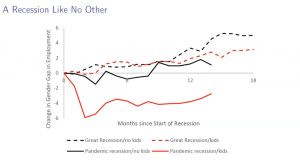
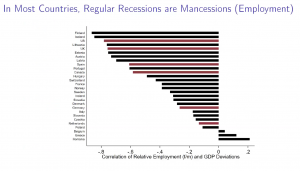
Our study documents the impact of the recession on the employment situation in advanced economies. It uses data to understand the role of childcare needs and other factors that led to gender differences. It found heterogeneity in the level of impact and revealed the role of policies and institutions in deciding the economic impact of the recession. The study says the pandemic recession will have a lasting effect on the labour market as it engineered a rise in employment flexibility in the post-pandemic world.
READ I Timely action on inflation needed to avert hard landing
Women with children suffer shecession
The study comes to the inevitable conclusion that the pandemic recession was a shecession in most countries. This was true for 18 of the 28 advanced economies covered by the study. It shows that the huge impact of the recession on working women is common among advanced economies. The study identifies industry/occupation effects and childcare needs as the main contributors of the bigger impact on women. Differences in policy measures taken during the recession may also have contributed to the intra-country differences in the impact of the crisis.
The flexibility provided by work from home arrangements cushioned the recession’s impact on women. The study suggests that work flexibility reduced the gender gap in the labour markets during the pandemic recession. But mothers working from home experienced a major decline in productivity because of childcare needs.
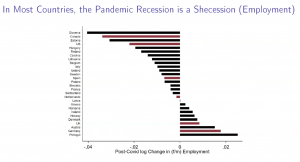
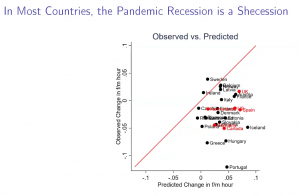
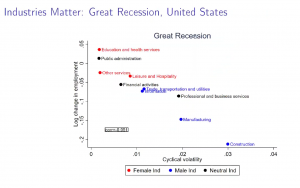
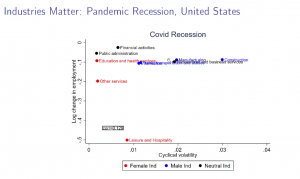
There are major qualitative differences between mancessions and shecessions arising from factors such as differences in labour supply dynamics for women and men. For women, the labour supply is elastic at the micro level, while for men it is less elastic, especially in the case of married men. The men who lose jobs during recessions are likely to remain in the labour force and get employment opportunities during the recovery.
The short- and long-term impacts of the pandemic recession on working women would be vastly different in developing and emerging countries. The reasons are the level of informal employment in developing countries and the lack of opportunities for remote-work. India is not as rich as the countries covered by our study. It has a per capita income of less than $2,000. There has been a huge reverse migration from the cities to villages during the pandemic, which was far worse during the second wave. All the workers have not yet come back to towns, resulting in short supply of labour for industries.
My worry is that while the men may come back to the cities, the women folk will stay back. If the women don’t come back, the children don’t come back and their education will suffer. This will have long-term implications for the economy in terms of skilling. The children of migrant labour not going to schools will have serious economic repercussions for India and other emerging markets.
(Michèle Tertilt is a Professor of Economics at the University of Mannheim. She is also a director of the Review of Economic Studies and a research professor at the Deutsche Bundesbank. This is an edited version of her presentation at a webinar organised by EGROW Foundation, a Noida-based think tank.)
